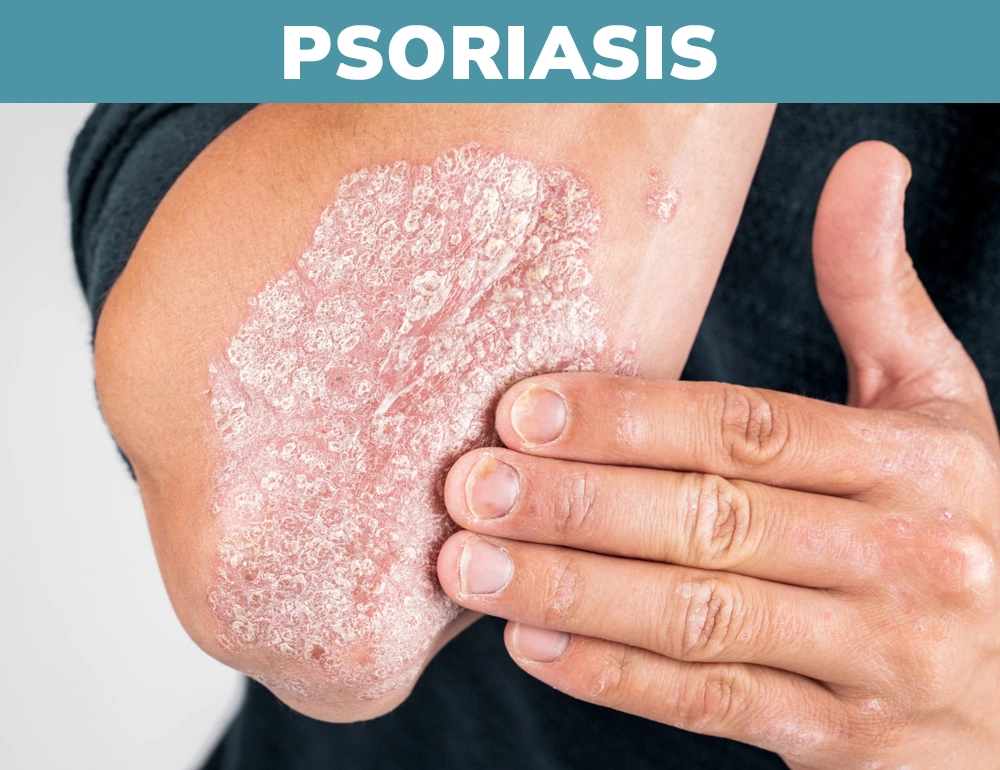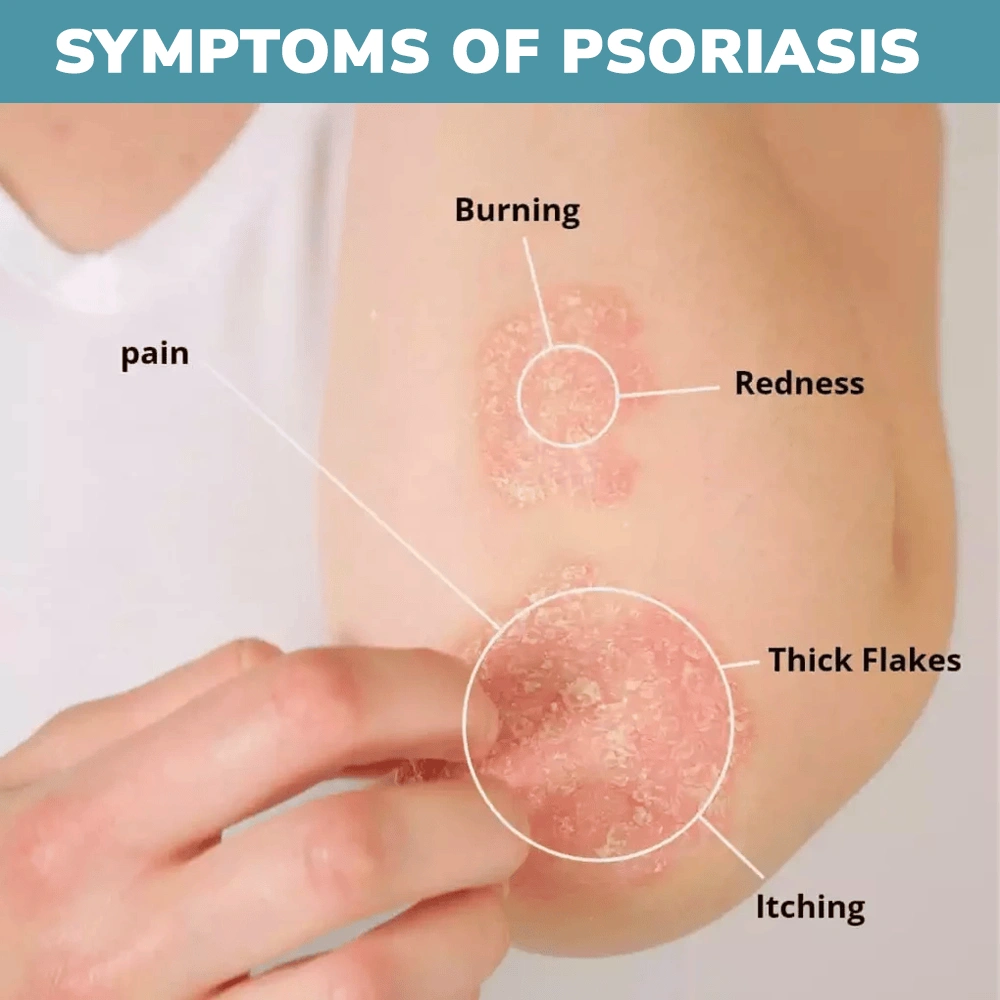Ayurvedic Treatment for Psoriasis
Achieve long-term remission from Psoriasis (Eka Kushtha & Kitibha Kushtha). Aksa Ayurveda offers personalized, root-cause treatment integrating classical Ayurveda with modern diagnostics for clear, healthy skin.
Call Now: 8826111667Reclaim Your Skin, Restore Your Health: Advanced Ayurvedic Psoriasis Treatment
At Aksa Ayurveda, we go beyond temporary relief. We leverage a powerful integration of classical Ayurvedic wisdom and modern medical science to dismantle the root cause of your psoriasis, guiding you towards lasting remission and profound well-being.
Are You Trapped in the Cycle of Psoriasis Management?
Living with psoriasis is a relentless challenge. The persistent itch, the visible plaques, the flaking skin, and the emotional toll can diminish your quality of life. Conventional treatments like steroid creams, light therapy, and powerful systemic drugs can offer temporary respite, but they often focus on suppressing symptoms rather than resolving the underlying systemic dysfunction. This can lead to a dependency on medications, potential side effects, and the frustrating return of flare-ups.
Aksa Ayurveda offers a paradigm shift. We see psoriasis not just as a skin disease, but as a signal of a deeper internal imbalance. Our approach is to heal from the inside out.

Psoriasis: Deconstructing the Condition from Two Perspectives
True healing is born from a comprehensive understanding. At Aksa Ayurveda, our physicians are proficient in both modern dermatology and the profound classical texts of Ayurveda to provide you with a complete diagnostic picture.
Section 1: The Modern Scientific Perspective
Modern medicine identifies psoriasis as a chronic, immune-mediated inflammatory disease with a strong genetic predisposition. In essence, your immune system's T-cells become dysregulated, mistakenly attacking healthy skin cells. This triggers a cascade of inflammation and causes skin cells to proliferate at an accelerated rate—up to 10 times faster than normal. This rapid cellular buildup creates the characteristic thick, scaly plaques. While triggers like stress, infection (strep throat), skin injury (Koebner phenomenon), and certain medications are well-known, the core issue is the dysregulated immune response.
Section 2: The Classical Ayurvedic Perspective - Kshudra Kushtha
Ayurveda has documented skin ailments with remarkable precision for millennia. Psoriasis correlates strongly with specific types of Kushtha (skin diseases), primarily falling under the category of Kshudra Kushtha. The two most relevant descriptions are:
- Eka Kushtha: This is the most classical correlation for Plaque Psoriasis. The ancient texts describe its symptoms with incredible accuracy:
- Aswedanam: Absence of sweating in the lesion.
- Maha Vastu: The lesion covers a large area of the body.
- Matsya Shakalopamam: The scales resemble the scales of a fish.
- These symptoms precisely mirror the clinical presentation of plaque psoriasis.
- Kitibha Kushtha: This variant is characterized by:
- Shyavam: Discolored, darkish-brown lesions.
- Kina-Khara-Sparsham: The lesion feels rough and thick to the touch.
- Parusham: Hardness of the affected skin.
- Kitibha describes the texture and chronic nature of psoriatic lesions.

The Ayurvedic Pathogenesis (Samprapti)
At Aksa Ayurveda, we treat the disease by breaking its pathogenic chain (Samprapti Vighatana). The development of psoriasis in Ayurveda follows a clear pathway:
- Nidana Sevana: Consumption of incompatible foods (e.g., dairy with fish), excessive intake of salty, sour, or heavy foods, and suppressing natural urges. Psychological stress is also a key factor.
- Dosha Dushti: These causes lead to a severe vitiation of Vata Dosha (responsible for dryness, scaling, pain) and Kapha Dosha (responsible for itching, thickness, discharge).
- Dushya Sammurchana: The imbalanced Doshas then contaminate the body's tissues (Dushyas), primarily Twak (skin), Rakta (blood), Mamsa (muscle), and Lasika (lymph). This creates deep-seated toxins (Ama).
- Sthana Samshraya: This toxic mixture relocates to the skin, manifesting as the lesions of Eka Kushtha or Kitibha Kushtha.
Our treatment is precisely targeted at reversing this process.
THE AKSA AYURVEDA TREATMENT PROTOCOL: A SYSTEMATIC APPROACH TO HEALING
Your Blueprint for Remission : Aksa Ayurveda Protocol
We reject a "one-size-fits-all" mentality. Your physiology is unique, and your healing protocol will be a testament to that. We follow a meticulous, evidence-based Ayurvedic framework.
Step 1: Comprehensive Diagnosis (Rogi Pariksha & Nidana Panchaka)
Your journey begins with an in-depth consultation. Our physician utilizes the Nidana Panchaka (five classical diagnostic tools) to understand the root cause, involving a detailed analysis of your history, lifestyle, diet, and a physical examination including Prakriti (body constitution) and Vikriti (current imbalance) assessment.
Step 2: Palliative Care & Healing
Following purification, we use a personalized combination of classical Ayurvedic classical formulations. These medications are not generic; they are selected to:
- Pacify your specific Dosha imbalance.
- Perform Rakta Shodhana (blood purification).
- Modulate the immune response.
- Promote skin healing (Twak Prasadana).
Step 3: Prescribed Diet & Lifestyle (Pathya-Apathya)
This is a cornerstone of our treatment. You will receive a detailed guide on Pathya (wholesome foods and lifestyle choices to support healing) and Apathya (unwholesome factors to avoid). This empowers you to actively participate in your recovery and prevent recurrence.
Step 4: Consistent Follow-up & Guidance (Punar-bhava Chikitsa)
Healing is a partnership. We conduct regular follow-up consultations to track your progress, fine-tune your protocol, and provide unwavering support. Our ultimate goal is to prevent recurrence and help you maintain long-term health.
Why Choose Aksa Ayurveda ?
The Aksa Ayurveda Advantage: Where Tradition Meets Modernity
- Integrated Expertise: Our physicians possess deep knowledge of both classical Ayurvedic texts and modern medical science for a complete and balanced approach.
- Root-Cause Pathogenesis Treatment: We don't just mask symptoms; we perform Samprapti Vighatana—we break the chain of disease formation.
- Authentic Panchakarma: We offer classical, supervised Shodhana therapies, which are critical for deep and lasting results in psoriasis.
- Pure & Classical Medications: We use time-tested, high-quality herbal formulations, free from harmful steroids and chemicals.
- Focus on Long-Term Remission: Our goal is not just temporary relief but to equip your body to prevent future flare-ups.
- Unwavering Patient Support: We are committed to being your guide and partner throughout your entire healing journey.
FREQUENTLY ASKED QUESTIONS (FAQs)
-
How is this different from other Ayurvedic treatments?
Our approach is strictly classical and systematic. We emphasize a proper diagnosis followed by Shodhana (purification) before starting Shamana (palliative medicine). Many places only offer palliative care, which may not address the deep-seated root cause. The integration with modern parameters ensures a precise, safe, and effective protocol.
-
Can Ayurveda cure psoriasis permanently?
Given psoriasis's autoimmune and genetic nature, "cure" is a complex term. Ayurveda's goal is to achieve long-term remission, a state where the disease is inactive and symptom-free. By correcting the root imbalance and adhering to Pathya-Apathya, many patients live flare-up-free for years, which is the most practical and achievable definition of a cure.
-
How long until I see results?
The healing timeline is individual. Factors include the chronicity and severity of your psoriasis, your body's responsiveness, and your commitment to the diet and lifestyle plan. Initial relief from itching and scaling may occur in 4-6 weeks, with significant clearance often observed over 3-6 months as the internal system heals.
-
What dietary changes are most important in psoriasis?
Your personalized Pathya plan is key. Generally, patients are advised to avoid inflammatory triggers like excessive salt, yogurt, black gram, seafood, radish, and highly processed or fermented foods. We emphasize a diet rich in easy-to-digest, anti-inflammatory whole foods.
-
Is Panchakarma necessary for everyone?
For most chronic and widespread cases of psoriasis, a proper Shodhana (Panchakarma) is highly recommended for the best long-term outcomes. However, the final decision is made by the physician after a thorough assessment. For milder cases or for patients who are not candidates for detoxification, a robust Shamana (palliative) protocol can also be effective.